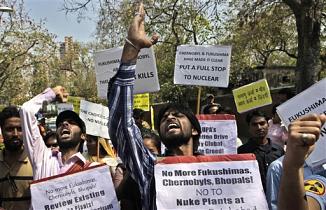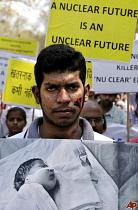Fukushima: Implications for India and globally
Nuclear disasters are not uncommon worldwide, but the each time a nuclear plant blasts and plays havoc with people and nature, humanity shivers with uncertainly.
Chernobyl nuclear tragedy caused severe damage to Socialist system of Soviet Union because their claim to popular welfare was called into question particularly by the western imperialist terrocracies.
Fukushima’s recent nuclear blast on March 11 has rocked the Japanese regime. People of Kudankulam, Indian state of Tamil Nadu have been protesting against the nuclear plant in their locality the radiation of which could affect even the nearby Kerala state and its capital Trivandrum. But the Manmohan regime, a puppet of western as well as Russia terrocracies that sell nuclear rectors to India, is deadly blind to the people's serious concerns and wants to push through the nuclear project against the will and wishes of the people.
Nuclear radiation could reach too far. Tokyo Shinbun has reported that many children in Koriyama City in Fukushima Prefecture, 50 kilometers from Fukushima Nuclear Power Plant, are suffering inexplicable nosebleed, diarrhea, and lack of energy since the nuke plant accident. A 39-year-old mother of two told the doctor that her 6-year-old daughter had nosebleed everyday for 3 weeks in April. For 1 week, the daughter bled copiously from both nostrils. The mother said their "doctor" told her it was just a seasonal allergy from pollen and nothing to worry, but she does not know the child is dying, for, the nosebleed was the result of radiation exposure.
Ionizing radiation has a deleterious effect on the immunity mechanism, particularly when large but sublethal doses are applied over a short period of time. The hematopoietic system is extremely sensitive, and a fall in the lymphocytes is one of the most characteristic manifestations. Active immunity is seriously interfered with if the irradiation occurs shortly before the injection of an antigen. There is also reduced resistance to pathogenic micro-organisms, which may lead to fatal infections. Prolonged irradiation at low levels does not seem to affect immunity adversely.
The Japanese government has been negligent. Victims have become restless and impatient with state mischief in shielding the nuclear plant owner, the Tokyo Electric Power Co.
At last, victims of Japan's nuclear crisis can claim compensation. But, they are angry. They are furious at the red tape they have to wade through just to receive basic help and in despair they still cannot get on with their lives seven months after the huge quake and tsunami triggered the world's worst nuclear disaster in 25 years. Evacuees who fled from Namie town near the tsunami-crippled Fukushima Daiichi nuclear power plant impatiently listened to government officials' explanations about how to apply for compensation at their temporary housing complex in Fukushima October 6, 2011.
About 80,000 people were forced to leave their homes by the Fukushima nuclear crisis of March 11. About 70 tenants of make-shift shelters who were forced to abandon their homes near the Fukushima nuclear plant after some of its reactors went into meltdown after the March 11 quake struck. But they are not satisfied and angry. They are furious at the red tape they have to wade through just to receive basic help and in despair they still cannot get on with their lives seven months after the world's worst nuclear disaster in recent times.
While the owner of the plant, Tokyo Electric Power Co, has made temporary payments to some victims, it was only last month that it finally began accepting applications for compensation. But the procedure is so complicated that it seems to just make things worse. "We don't know who we can trust!" one man yelled in the cramped room where the officials were trying to explain the hugely complex procedures to claim compensation. Can we actually go back home? And if not, can you guarantee our livelihoods?"
An Asahi newspaper poll showed this month that 43 percent of evacuees still want to return, down from 62 percent in June.
A government panel overseeing the compensation scheme estimates claims are likely to reach 3.6 trillion yen ($46.5 billion) in the financial year to next March.
But the claim procedure is so complicated that it seems to just make things worse. After claimants have read a 160-page instruction manual, they then have to fill in a 60-page form and attach receipts for lodging, transportation and medical costs. It's too difficult for even educated people, let alone the innocent Fukushima victims. There may be times when the content is difficult to understand or in some cases our employee in charge may not grasp it fully. There many Japanese victims who still has not applied for compensation even though they have lost jobs or businesses and are running out of cash.
So far just 7,100 individuals have applied to Tepco for compensation out of the 80,000 it send forms to. And of the 10,000 businesses in the Fukushima area, a mere 300 have submitted claims. The company expects a total of 300,000 claims from businesses given that the impact of the radiation crisis has been so widespread.
One clause in the original instruction booklet telling victims they would have to agree to waive their right to challenge the compensation amount in order to receive payment provoked a public uproar. Chastised by the government, the company promised to drop the clause, issued a simplified 4-page instruction booklet and assigned 1,000 employees to Fukushima prefecture to help victims with the process.
The complexity of the task is one deterrent. There is another -- the perception that Tepco is not playing fair and Japanese regime tries to shield it. Tepco is accused of failing to take sufficient safety measures at the Fukushima plant even though it knew the risks and then deliberately underplaying the extent of the accident. It is also seen as insensitive..
What is more pathetic is confidence in the authorities is low. The government is seen as having bungled its early response to the crisis and being secretive about what was really happening.
Victims can sue but that is rare. Junichi Matsumoto, a Tepco official, said the utility faces about 10 lawsuits so far. He declined to disclose details but said some were seeking more than the firm deemed appropriate. Yuichi Kaido, an attorney and the secretary-general of the Japan Federation of Bar Associations, said lawsuits are considered a last resort in conservative rural northeast Japan. "In the end, many lawsuits could take place," he said.
Reimbursement for moving and transportation costs associated with evacuating, compensation for damage to health, lost jobs, and psychological suffering -- only deepens frustration over what they have lost.
Tokyo Electric said it will pay about 100,000 yen a month for the period to end of August as compensation for psychological trauma. After that, the sum will be halved. "Evidence that we have lived our lives is completely destroyed and for that, we are told that we will be compensated 100,000 yen for our psychological suffering.
The final compensation depends on whether and when victims will be able to return to homes within a 20-km evacuation zone. That question remains unanswered, breeding a growing sense of resignation among evacuees. Some said they doubt they will ever be able to go home and suggested their entire towns simply be relocated and many worry about long-term health effects of radiation.
The fate and destiny of the nuclear victims of Fukushima, just like the peoples in NATO occupied Islamic nations, now depends entirely on the mercy of global capitalist networks engaged in imperialist wars for energy security. ..
History of nuclear disasters especially the Fukushima nuclear crisis have paramount importance to people of Kudamkulam and they must pursue their fundamental right to live free from nuclear radiation more vigorously to remove the nuclear plant from their soil disaster.
Rulers, leaders, bureaucrats who make policy disregarding the wishes of people do not live on the nuclear plant zones. The regimes must listen to inner voice of humanity against nuclearization of their soil.
About the writer:

Dr. Abdul Ruff, Specialist on State Terrorism; Educationalist;Chancellor-Founder of Centor for International Affairs(CIA); Independent Analyst;Chronicler of Foreign occupations & Freedom movements(Palestine,Kashmir, Iraq, Afghanistan, Pakistan, Xinjiang, Chechnya, etc); Anti-Muslimism and anti-Islamism are more dangerous than "terrorism" Anti-Islamic forces & terrorists are using criminal elements for terrorizing the world and they in disguise are harming genuine interests of ordinary Muslims. Global media today, even in Muslim nations, are controlled by CIA & other anti-Islamic agencies. Former university Teacher: Website: http://abdulruff.wordpress.com/91-9961868309/91-9961868309
Comments
There are 0 comments on this post















